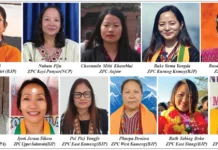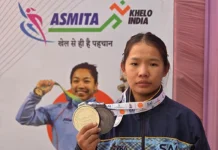ITANAGAR, 14 Jun: The Arunachal Pradesh Women’s Welfare Society (APWWS) has strongly urged the Law Department to take immediate steps toward establishing separate child-friendly special courts, as mandated under the Protection of Children from Sexual Offences (POCSO) Act, 2012.
The APWWS suggested that the establishment of these courts should begin with the capital region and extend across all districts in a phased manner.
In a representation to the law commissioner on Friday, the APWWS stated that while the district and sessions court and additional sessions court have been designated as special courts under Section 28 of the POCSO Act, 2012, dedicated child-friendly special courts with appropriate infrastructure and environment remain absent in Arunachal Pradesh.
Although the Act has been in force for over a decade, Arunachal still lacks the necessary facilities to ensure a child-sensitive legal process.
“As an organization working at the grassroots level, we are regularly informed by victims’ families and stakeholders about deeply concerning incidents. The absence of separate waiting rooms and dedicated facilities frequently results in traumatic encounters between child victims and the accused.”
“In several instances, child victims have come face-to-face with alleged perpetrators due to inadequate infrastructure, which severely compromises their mental and emotional wellbeing,” APWWS president Kani Nada Maling said in the representation.
The POCSO Act mandates the establishment of child-friendly special courts to ensure speedy trials, protect victims, and maintain confidentiality throughout the legal process.
The Act’s core objectives are undermined when designated special courts lack the infrastructure to support a truly child-friendly environment, the APWWS said.
Highlighting the critical issues observed in current court proceedings in handling cases, the APPWS stated that shared entry and exit points for both victims and accused is creating unavoidable confrontations.
There are no dedicated waiting areas for child victims, leaving them vulnerable and anxious. Additionally, there is a lack of privacy and confidentiality, with no counselling rooms or private interaction spaces.
The APWWS said that absence of videoconferencing facilities is making court appearances intimidating and “re-traumatizing.” Furthermore, shared bathroom facilities is causing additional distress and compromising dignity, it said.
The APWWS stated that frequent encounters between victims and accused within court premises affect victims’ mental health and willingness to testify.
It said also that there are no designated support persons to guide victims through the judicial process.
“These critical gaps not only re-traumatize child victims but actively undermine the POCSO Act’s protective objectives,” the representation said.
The APWWS stated that these courts must strictly comply with POCSO guidelines and include separate entry and exit points for victims and accused persons, dedicated waiting rooms with child-friendly amenities and comfort facilities, counselling rooms staffed with trained child psychologists and social workers, videoconferencing facilities to eliminate direct confrontation, in-camera trial settings ensuring complete privacy and confidentiality, separate bathroom facilities exclusively for child victims, designated support persons as mandated under the Act and child-friendly furniture and courtroom design to minimize fear and intimidation.
The APWWS stated that establishment of such courts would fulfil the legal obligations under the POCSO Act while demonstrating the Government of Arunachal Pradesh’ unwavering commitment to protecting children’s rights and dignity.
“Every day of delay potentially subjects more children to avoidable trauma within our justice system,” it said, seeking the commissioner’s urgent intervention in implementation of these vital measures.




